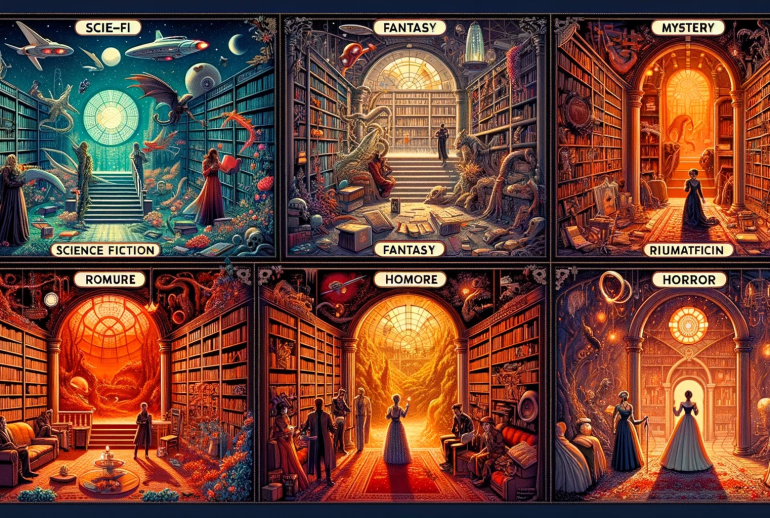Writing is a journey of exploration and self-discovery, and for some writers, that journey leads them across the diverse terrain of multiple literary genres. In this article, we’ll delve into the challenges and rewards of venturing into different genres, as well as offer valuable insights on how to successfully transition between them.
The Call of Diverse Genres
Every genre is like a unique world, with its own rules, customs, and inhabitants. While some writers find their niche in a single genre, others are drawn to explore various literary realms. Here are some compelling reasons why writers may choose to write across multiple genres:
-
Artistic Exploration: Writing in different genres allows writers to experiment with different styles, voices, and themes, fostering artistic growth and versatility.
-
Creative Challenge: Each genre presents unique challenges, from the intricacies of crafting a mystery to the emotional depth of literary fiction. For many writers, overcoming these challenges is rewarding in itself.
-
Expanding Audiences: Writing in multiple genres can attract a wider readership. Readers who enjoy an author’s work in one genre may be curious to explore their writing in others.
-
Avoiding Burnout: Switching between genres can prevent writer’s block or burnout, as it keeps the creative juices flowing and provides a fresh perspective.
The Rewards of Genre Exploration
Venturing into different genres can yield several rewards:
-
Enhanced Creativity: Writing in diverse genres stimulates creativity and encourages writers to think outside the box, leading to fresh ideas and innovative storytelling.
-
Skill Development: Each genre hones specific writing skills. For instance, writing a thriller sharpens pacing and suspense-building abilities, while literary fiction focuses on character depth and emotional resonance.
-
Versatility: Becoming proficient in various genres makes a writer more versatile and adaptable, able to tackle a wider range of projects and market opportunities.
Challenges of Genre Hopping
While exploring multiple genres can be rewarding, it comes with its set of challenges:
-
Reader Expectations: Readers may have expectations based on an author’s previous work in a particular genre. Switching genres can sometimes disappoint or confuse loyal fans.
-
Marketability: Building a brand and establishing a presence in multiple genres can be challenging, as it may require separate marketing strategies and author personas.
-
Time and Focus: Writing across genres demands time and focus to research, understand, and master the conventions and nuances of each genre.
Successfully Transitioning Between Genres
For writers eager to navigate the diverse literary landscape, here are some tips for successfully transitioning between genres:
-
In-Depth Research: Immerse yourself in the genre you plan to explore. Read extensively within that genre, studying notable works to understand the conventions, tropes, and reader expectations.
-
Hone Your Craft: Develop the specific skills required for each genre. If you’re switching from romance to science fiction, work on world-building and technological concepts.
-
Plan and Outline: Before diving into a new genre, plan and outline your story meticulously. Having a clear roadmap will help you navigate unfamiliar territory.
-
Seek Feedback: Share your work with beta readers or critique partners who are familiar with the genre. Their insights can help you refine your storytelling.
-
Maintain a Consistent Voice: While the style and tone may vary between genres, strive to maintain a consistent authorial voice that carries your unique perspective.
-
Gradual Transition: Consider transitioning gradually. Write a short story or novella in the new genre before embarking on a full-length novel.
Case Studies: Successful Genre-Hopping Authors
Let’s look at a few authors who have successfully navigated multiple genres:
-
Stephen King: Known for horror, King has also written science fiction, fantasy, and crime novels, demonstrating his ability to excel in diverse genres.
-
Neil Gaiman: Gaiman has moved seamlessly between fantasy, horror, graphic novels, and children’s literature, earning accolades in each field.
-
J.K. Rowling: After conquering the world of fantasy with the “Harry Potter” series, Rowling ventured into crime fiction under the pseudonym Robert Galbraith, showcasing her versatility.
Conclusion: Embracing Literary Exploration
Writing across multiple genres is an exhilarating journey that challenges and enriches a writer’s craft. It offers the chance to explore new horizons, develop diverse skills, and captivate a wide range of readers. While it presents its challenges, the rewards of genre exploration are immeasurable. By approaching each genre with dedication, research, and a commitment to mastering its unique nuances, writers can successfully navigate the diverse literary landscape, leaving an indelible mark on the world of storytelling.



